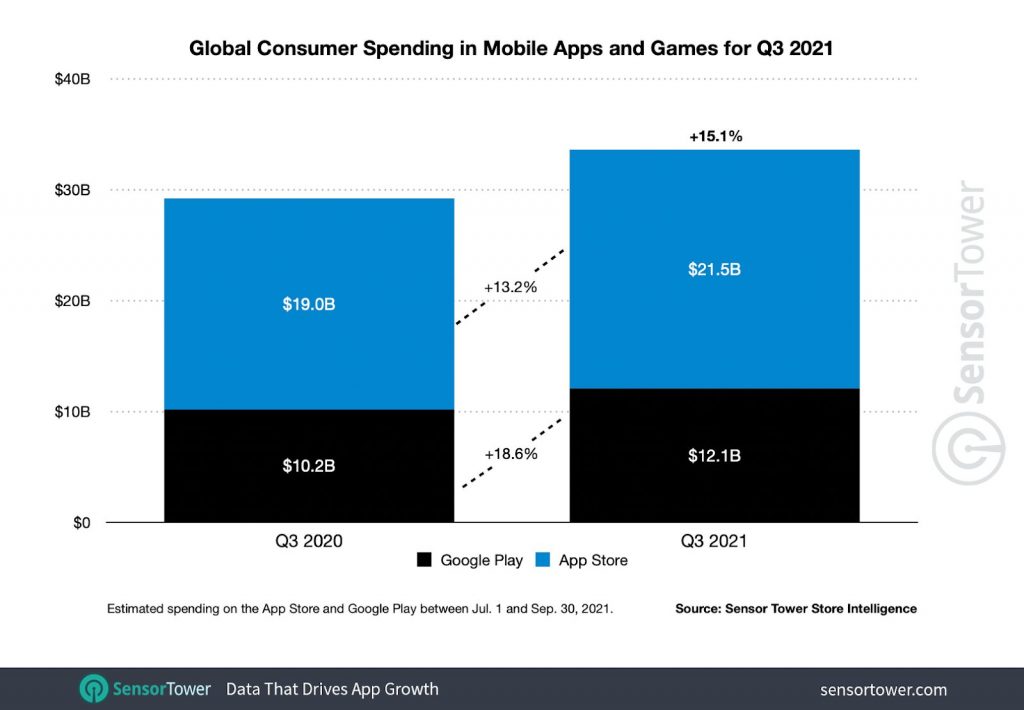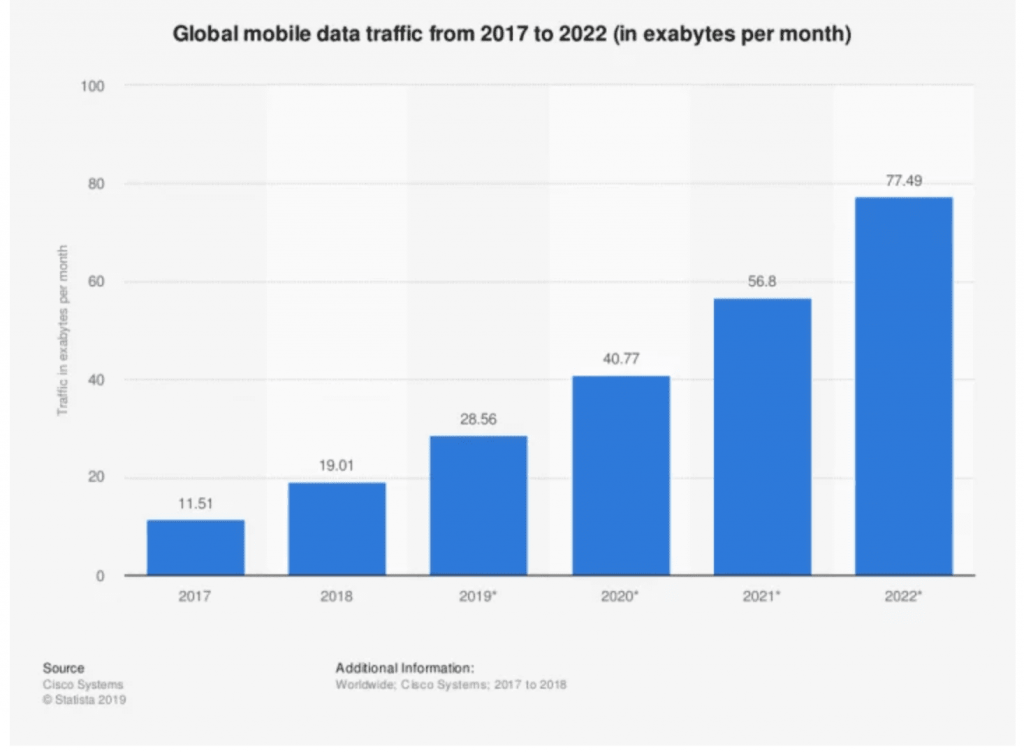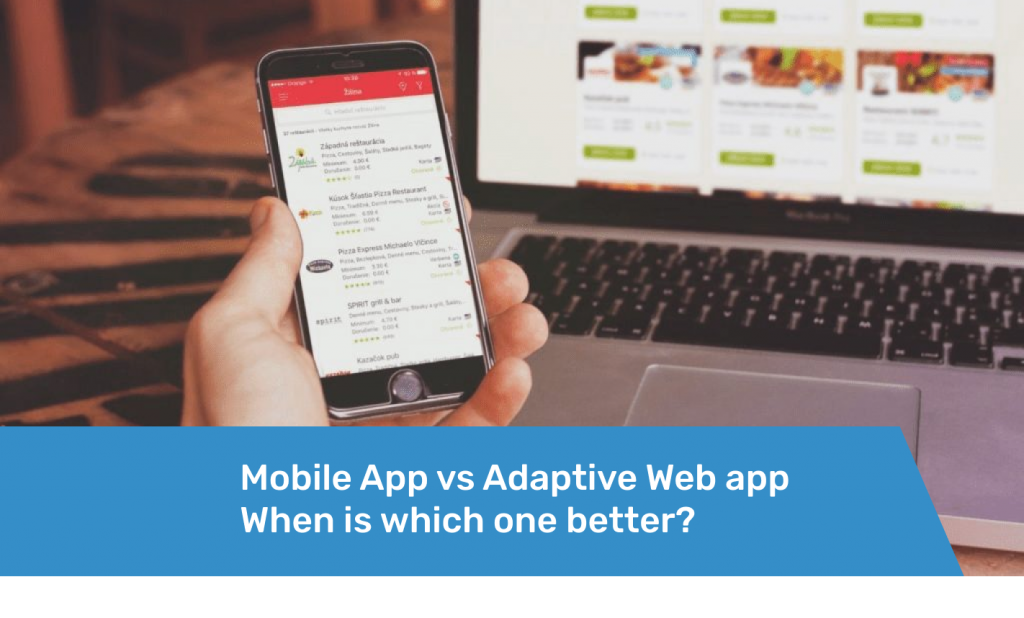App or mobile website? In this post, we are going to discuss what you have to keep in mind before making a choice. Yet sometimes it may be good to take both options.
Mobile apps vs responsive websites. Numbers show that the current preferences go to mobile apps. During the autumn of 2021, for example, people spent more than 33 billion USD globally on mobile apps and their first installs, Sensor Tower’s report says. It was ignited by the Pandemic in 2020 and the demand keeps growing around 26% year after year.

You may be wondering what responsive design for mobile applications is. Responsive means being able to adjust various parameters like size of a screen, fonts, etc, so the content is readable and pleasant looking no matter the gadget. It is also called an adaptive website. As a rule, it is developed with a mobile priority approach. Mobile is the first “tester”, and afterwards everything is accommodated on much larger screens.
By the way, if you are interested in how to launch your mobile app, we invite you to have a look at our recently published article with tips and tricks to guide you through the whole process.
So how do mobile apps and responsive websites differ?
Choosing Between Two “Similar” Concepts
First thing first. A responsive website works both online and offline while a mobile app is limited to the online version only. Mobile application is certainly downloadable. We definitely recommend taking this option into account.
Among some decisive differences between the cost, functionality and other aspects, the main task for you remains the same – what do you want your product to do exactly? All the possible insights are going to drive you to your launching choice.
For the audience just reading your content without any unique features, creating a mobile website is enough. But if you want to implement features, device integration, etc, you are obviously more into a mobile app direction.
In mobile app development you either create a native app designed specially for IOS or Android or a cross platform app, so that it will be available to almost everyone. The topic is worth an in-depth separate post covering all the aspects and debatable questions. We will only point out now that if your business project embraces both a website and a mobile app, you will have to invest two times more minimum, than you are enough with a website.
It is worth noting that mobile applications are richer in functions. For example, the cloud based constant synchronization. This way all the updates of data are always synchronized once you are connected to the Internet. No headaches and unnecessary stresses about your information being up to date. The option of synchronization is quite common nowadays among app developers and other entrepreneurs who are about to launch their start-ups.
With a responsive website things are easier. It is not being downloadable but adapted with the design and functions to make users feel comfortable.
Certainly, there are situations when you can profit from having both variants. Our ideal scenario is like this – you have just a website for presentation first and then an application is offered.

It is crucial for you to have a clear vision of your product. Instagram, for instance, they boast a cool device compatibility, that is how good it works on different devices. They represent themselves via the application only, and the website is just an additional service.
All in all, a mobile website has two major benefits compared to the mobile application. First of all, the cost, so the budget may be relatively smaller compared to mobile apps. Then device compatibility so the only thing you need is a good Internet connection. It doesn’t matter which device we use.
Consider upgrades for a moment. If you upgrade your website, you just make content changes, and everyone will see them right away. But with mobile applications it is different. Launching a separate version is only one step, then people will have to download it. Not that easy, right? Think of it carefully in your dilemma – mobile site vs app.
Users’ involvement and practice is what matters most. Whatever you may do, just think about the experience people need.
If You are Up to Responsible websites…
- You reach all types of users with no downloading or installation headache. Moreover, most of the content is free. No matter the OS, people use a responsive website on their smartphones with no effort. If only the Internet connection is decent.
- You enjoy easy bug fixing and upgrading. Compared to mobile apps, there is no need to waste time installing the upgraded version. It is even unnoticeable most of the time.
- Budget saving. Developing a mobile website is a way simpler and cheaper. This also refers to support and maintenance.
In case you choose a Mobile app you get…
- Advanced features and wide functionality is what makes a big difference if we compare the two ones. Instagram users, for instance, are able to access photos via the website but no way they upload something new unless with the app.
- More guarantees about data protection. Although a lot of personal info is being used while installing, apps have proved to be much safer than any browser.
- You can use the app offline. It is a great feature when you are traveling or your current location does not boast a cool connection. Google maps, Apple music, BBC news, for instance, a lot of their important features can be accessed offline.
Apps are more personal if we talk of the interface. User-friendliness is mostly what conquers people’s hearts. Content usually uploads faster in the app and less mobile data is wasted.

If you cannot choose between a mobile or web app solution and what you need to develop, you ask our specialists and they can help to choose rightly.

Responsive websites vs mobile apps. At first sight they do seem very alike, but now, as we have just immersed ourselves into the topic a bit deeper, we developed a vision of two very essential, coherent and yet quite different concepts.
The choice is yours and it relies on the goals you’ve set. If you focus on better interactions and user engagement, a mobile app is the optimal option. Or if you prefer sharing user-friendly content to a big audience, then a mobile website is surely better.
Still having doubts? You are welcome to contact us anytime! Our ZenBit Tech team will guide you to the optimal choice in developing your dream!






